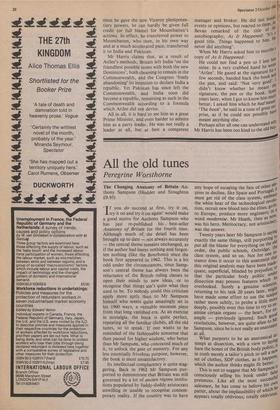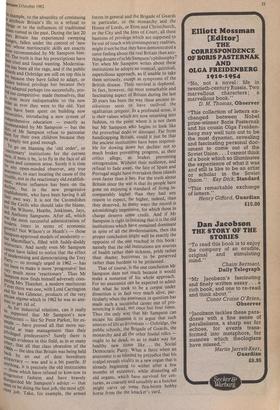All the old tunes
Peregrine Worsthorne
'If you do succeed at first, try it on, try it on and try it on again' would make a good motto for Anthony Sampson who has just re-published his best-seller Anatomy of Britain for the fourth time. Although much of the detail has been brought up to date — not always accurately — the central theme remains unchanged, as if the author had learnt nothing and forgot- ten nothing (like the Bourbons) since the book first appeared in 1962. This is a bit odd under the circumstances, since Samp- son's central theme has always been the reluctance of the British ruling classes to open their minds to new ideas, or to recognise that things ain't quite what they used to be. To nobody could this criticism apply more aptly than to Mr Sampson himself who seems quite amazingly set in his 1960 ways, a veritable museum piece from that long vanished era. As an exercise in nostalgia, the book is quite perfect, repeating all the familiar cliches, all the old tunes, so to speak. If one wants to be reminded of the fashionable nonsense that then passed for higher wisdom, who better than Mr Sampson, who concocted much of it, to unlock the gate of memory. For any less essentially frivolous purpose, however, the book is most unsatisfactory.
Its intellectual complacency is quite stag- gering. Back in 1962 Mr Sampson pur- ported to demonstrate that Britain was still governed by a lot of ancien regime institu- tions populated by fuddy-duddy aristocrats unwilling or unable to recognise contem- porary reality. If the country was to have any hope of escaping the fate of other em pires in decline, like Spain and Portugal', it must get rid of the class system, embrar the white heat of the technological rev°!u. tion, recruit new blood into the elites, g° to Europe, produce more engineers; in a word modernise. Mr Heath, then as 11°w' was his hero. Meritocracy, not aristocracY' was the answer. Twenty years later Mr Sampson is saYll! exactly the same things, still purporting t;`), put all the blame for everything on the old order, the public schools, Oxbridge, t' class system, and so on. Not for one 111; stance does it occur to this anatomist this original analysis may have been inade- quate, superficial, blinded by prejudioe;,°r that the particular body politic ortle dissection may possess features which overlooked. Surely a genuine scientist' returning to his task 20 years later, Iniglji have made some effort to use the scalPe rather more subtly, to probe a little 111°re' deeply, possibly even this time to trY to ex: amine certain organs — the heart, for e- ample — previously ignored. Such g°. resolutions, however, are quite alien to MI Sampson, since he is not really an anatomic at all. What purports to be an anatomical at- tempt at dissection, with a view to Wing. bare the bones of the British body politic, is in truth merely a tailor's pitch to sell a new set of clothes, SDP clothes, as it haPPerls' which the author thinks might fit better. This is not to suggest that Mr Sampson is
consciously selling his book under fall Like all the most success salesmen, he has come to believe his Oa patter, about the implausibility of which he appears totally oblivious; totally oblivious' or example, to the absurdity of continuing to attribute Britain's ills to a refusal to
change or to the influences of traditional values rooted in the past. During the last 20 Years Britain has experienced sweeping llanges, fallen under the control of 'new Ten' whose meritocratic skills are exactly 'nose recommended by Mr Sampson him- self. The truth is that his prescriptions have °I,kb tried and found wanting. Modernisa- Intl, has been all the rage, and if the public
serlools and Oxbridge are still on top this is not because they have failed to adapt, or
hidden behind privilege but because they "Lave adapted perhaps too successfully, pro- :fled too competitive: made themselves, that even more indispensable to the new rder as ever they were to the old. Vast s urns have been spent on building new aniversities introducing a new system of comprehensive education — exactly as heck °Mrnended by Mr Sampson — but the th es of Mr Sampson refuse to patronise a ern for their own children because they re simply not good enough. , To go on blaming the 'old order', or reactionary' institutions for the current
Mess, if mess it be, is to fly in the face of all
rfeasou and common sense. Surely it is time ,or any open-minded observer, any true
trouble, to start locating the cause of the trouble, not in the reactionary old establish-
ment, whose influence has been on the 'eeline but in the new progressive establishment, who have been having it all
heir own way. It is not the Cavendishes
athe Cecils who should take the blame, nt the Wilsons, Heaths, Jenkinses, Jays, asind Anthony Sampsons. After all, which as the most successful administration of modern times in terms of economic toWth? Not Wilson's or Heath's — those
hut models of modernity — Macmillan's filled with fuddy-duddy aristocrats. And surely even Mr Sampson Of have failed to notice that the effect
"1 Modernising and democratising the Tory patty — so strongly urged in 1962 — has vet been to make it more 'progressive' but sary Much more 'reactionary'. Thus Mr MPson now finds himself adversely com- Darin if Mrs Thatcher, a modern meritocrat , ever there was one, with Lord Carrington an ever Sir Ian Gilmour, products of the very irsricien regime which in 1962 he was so anx- ious to get rid of. b As for industrial relations, can it really e rnsuPposed that Mr Sampson's new aetitocrats — like Sir Peter Parker, for ex- - have proved all that more suc- ,-,si,ul at man management than their "vdeged predecessors? Surely there is enough evidence in this field, as in so many ia_ther, that all that class obsession of the b'ntis — the idea that Britain was being held a,zack bY an out of date hereditary -istocraey — was and is a bit puerile. If anything it is precisely the old institutions those which have refused to kow-tow to ciPI:ogressive fashion and have bravely ,Isregarded Mr Sampson's advice — that 'ceerla to be doing the best job, the most effi- ient job. Take, for example, the armed
forces in general and the Brigade of Guards in particular, or the monarchy and the House of Lords, or Eton and Christchurch, or the City and the Inns of Court, all these bastions of privilege which are supposed to be out of touch with contemporary realities, might it not be that they have demonstrated a surer feeling about the real Britain than any- thing dreamt of in Mr Sampson's philosophy? Yet when Mr Sampson writes about these institutions he adopts an ironical, quizzical, supercilious approach, as if unable to take them seriously, except as symptoms of the British disease. Their survival is deplored.
In fact, however, the most remarkable and fascinating aspect of Britain during the last 20 •years has been the way these ancient in- stitutions seem to have outlived the
egalitarian zeitgeist. In a profound sense, it is their values which are now returning into
fashion, to the point where it is not them but Mr Sampson who begins to look like the proverbial dodo or dinosaur. Far from handicapping Britain, could it just be that the ancient institutions have been responsi- ble for slowing down her decline: not so much brakes preventing progress, as their critics allege, as brakes preventing retrogression. Without their resilience, and refusal to fade away, the fate of Spain and Portugal might have overtaken these islands even faster than it has. For the truth about Britain since the war is that its people have gone on enjoying a standard of living in- comparably higher than they had any reason to expect, far higher, indeed, than they deserved. In many ways the record is astonishingly impressive, for which those in charge deserve some credit. And if Mr Sampson is right in insisting that it is the old institutions which have remained dominant in spite of all the modernisation, then the proper conclusion might well be exactly the opposite of the one reached in this book: namely that the old institutions are sources of health rather than sickness, pride rather than shame; buttresses to be preserved rather than burdens to be jettisoned. That of course, is the one conclusion Mr Sampson dare not reach because it would make a nonsense of his whole approach. For no anatomist can be expected to admit that what he took to be a corpse under dissection is in fact very much alive, par- ticularly when the anatomist in question has made such a successful career out of pro- nouncing it dead, not once but four times. Thus the only way that Mr Sampson can escape his dilemma is to argue that such sources of life as do remain — Oxbridge, the public schools, the Brigade of Guards, the monarchy and all the other feudal relics ought to be dead, so as to make way for healthy new tissue like ... the Social Democratic Party. What a farce when an anatomist is so blinded by prejudice that his scalpel reveals vitality in a new organ that is already beginning to wither after a few months of existence, while dissecting all old organs, which have survived for cen- turies, as coarsely and unsubtly as a butcher might carve up some flea-bitten hobby horse from the the knacker's yard.







































 Previous page
Previous page